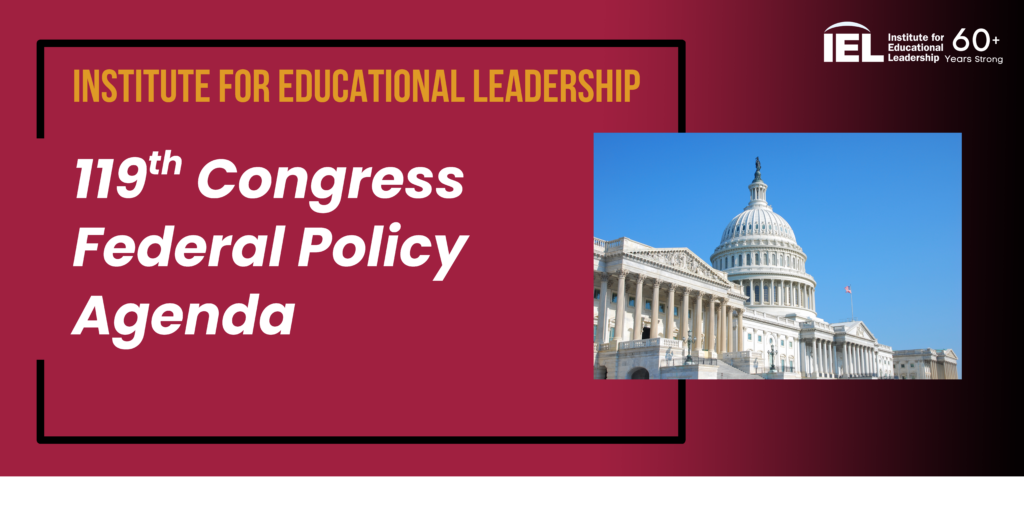The Institute for Educational Leadership (IEL) changes systems through people and believes in a society in which shared leadership effectively uses all available resources for the betterment of their communities. The following policy principles guide our policy agenda:
- Greater voice in decision-making, particularly from families, young people, community members, and people with disabilities
- Prioritization of high-need communities
- Cross-sector partnerships and collaboration that reflect the interdependent, overlapping nature of our work
The three overarching areas for IEL’s 119th Congress Federal Policy Agenda are:
- Increase Funding for Key Programs and Initiatives that Promote High-Quality Learning Opportunities and Student Supports
- Advance Policies that Address the Foundational Supports Children, Families, and Communities Need to Thrive
- Promote Workforce and Leadership Opportunities for Students, Families, and Teachers in their Schools and Beyond
Increase Funding for Key Programs and Initiatives that Promote High-Quality Learning Opportunities and Student Supports: IEL supports federal programs that promote a high-quality education opportunities that will lead to sustainable learning environments.
- Take the lead in growing the Full-Service Community Schools (FSCS) Program by advocating for the reintroduction of the Full-Service Community Schools Expansion Act (H.R.6576/S.3360 from the 118th Congress).
- Advocate for Congress to continue funding for Titles I, II, and IV-A Student Support and Academic Enrichment Grant of the Every Student Succeeds Act; IDEA Part B and C, including Preschool Grants and Grants for Infants and Toddlers; Full Service Community Schools; Promise Neighborhoods Program; Nita M. Lowey 21st Century Community Learning Centers;Child Care and Development Block Grants, or equivalent programs within and beyond the U.S. Department of Education that support the education and well-being of children and youth cradle-to-career.
- Advocate for Congress to fully fund the Individuals with Disabilities Education Act (IDEA) to fulfill the federal promise to provide 40 percent of the extra cost of special education.
- Advocate for Congress to provide funding to equip schools with an adequate number of specialized instructional support personnel, including school nurses, social workers, psychologists, and counselors, to provide the support students need to engage in the classroom.
- Advocate for Congress to continue funding for the Statewide Family Engagement Centers Program to support family-school partnerships and create opportunities for parents to engage in collaborative leadership practices.
- Advocate for Congress tobroaden and enhance programs that support school and district administrators to improve student outcomes and promote academic outcomes.
- Support Congress in passing the American Teacher Act (H.R.2021) and reintroducing the Pay Teachers Act (S.766 from the 118th Congress) to improve the teacher pipeline by increasing salaries and updating teacher preparation programs to reflect the changing needs of today’s students in the classroom.
- Support Congress to continue funding for Title II-Part A state grants, Title II-Part B school leader recruitment and support grants, and Supporting Effective Educator Development (SEED) programs to provide teachers and other school staff with resources to pursue professional development and leadership opportunities.
- Support Congress in increasing funding to the Pell Grant, GEAR Up, and TRIO programs to make college more affordable and accessible.
Promote Mentoring and Workforce Development Opportunities for Young People in their Schools and Beyond: IEL advocates for programs and legislation that foster collaborative leadership across all sectors and create opportunities for young people to prepare for fulfilling careers.
- Advocate for Congress to broaden and enhance programs that support youth development, such as the Office of Juvenile Justice and Delinquency Prevention’s Youth Mentoring Program, and other programs that expand leadership opportunities and career pathways for underserved youth.
- Advocate for Congress to pass the Mentoring to Succeed Act (H.R. 811/S.299) to establish school-based mentoring programs for at-risk youth focusing on skill development.
- Advocate for Congress to pass the Youth Workforce Readiness Act (H.R.2910), to create a competitive grant program to support coordination of schools, businesses, out-of-school time organizations, and others to offer workforce readiness programming for youth ages 6-18.
- Advocate for Congress to expand funding for federal apprenticeship programs and other programs that help young people and adults earn a living wage.
Partner with Coalitions Leading the Way to Advance Policies that Address the Foundational Supports Children, Youth, Families, and Communities: IEL collaborates with other issue-based coalitions for programs and legislation that create conditions in which community members have access to foundational supports that will enable them to live, work, and attend school knowing their basic needs are met.
- Advocate for Congress to address youth mental health and well-being in schools.
- Support Congress in addressing homelessness through the Continuum of Care, Emergency Rental Assistance, and other affordable housing programs, and ensure that children have continual access to school and transportation through the McKinney-Vento Homeless Assistance Act.
- Support Congress in passing the Child Care for Working Families Act (H.R. 1826/S. 169), which increases the quality and supply of childcare and lowers childcare costs for families.
- Support Congress in continuing to fund SNAP benefits.
- Support Congress in renewing the Expanded Child Tax Credit to continue to reduce child poverty and support whole-child development by providing families with more financial resources to meet their children’s academic and health needs.
